Abstract
This paper reviews the premenstrual syndrome (PMS) from a historical and psychological perspective. The physician must recognize that the premenstruum—the four days before the onset of the menses—is a `high risk' phase for women. They may demonstrate somatic and psychological complaints such as irritability, aggression, tension, anxiety, depression, lethargy, insomnia, poor coordination and concentration. Psychological disturbances can range from self-deprecation and the feeling that `everything is too much' to pronounced feelings of oppression and depression. Psychiatric patients may become even more disturbed at this time. Recent reviews on PMS have studied its etiology and its possible connection to hormone imbalance, but to date there is no complete explanation for the syndrome's psychological symptoms. The most promising treatments for the psychological symptoms of PMS are pyridoxine (although there are conflicting reports about it), antidepressants, benzodiazepines if anxiety and tension dominate, and ongoing psychotherapy for severe cases.
Full text
PDF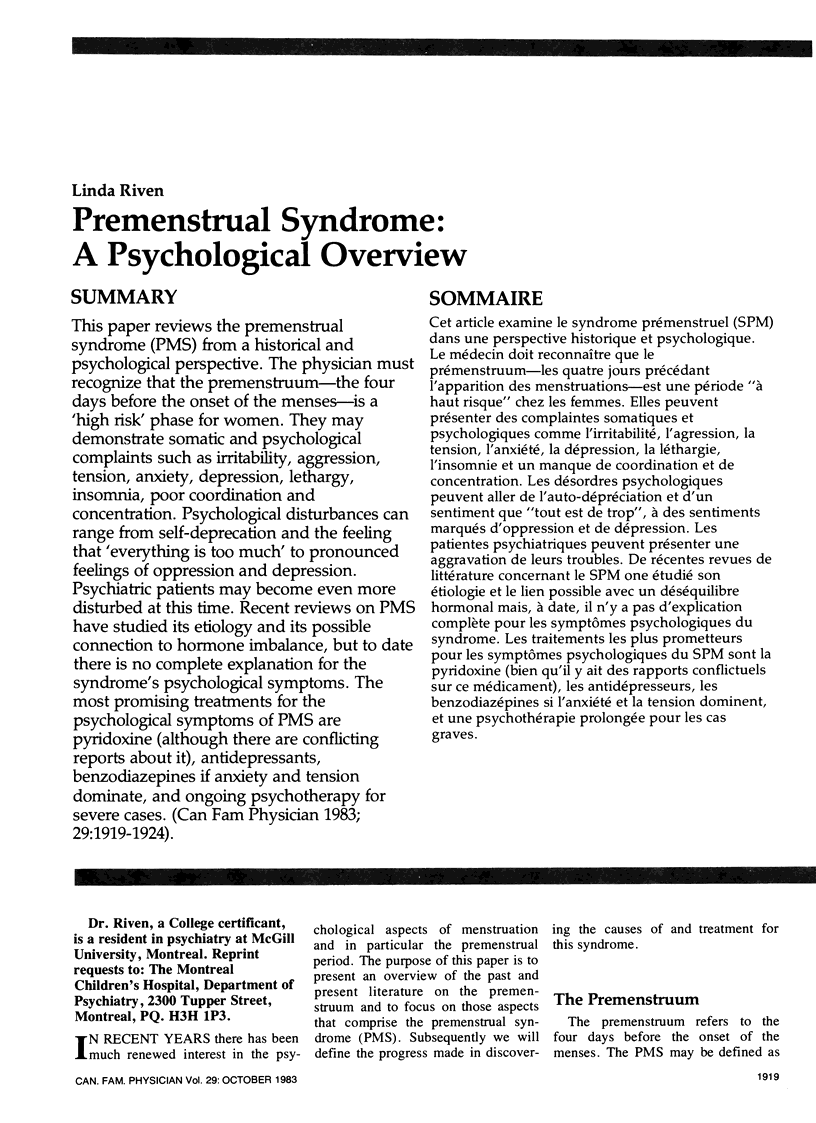
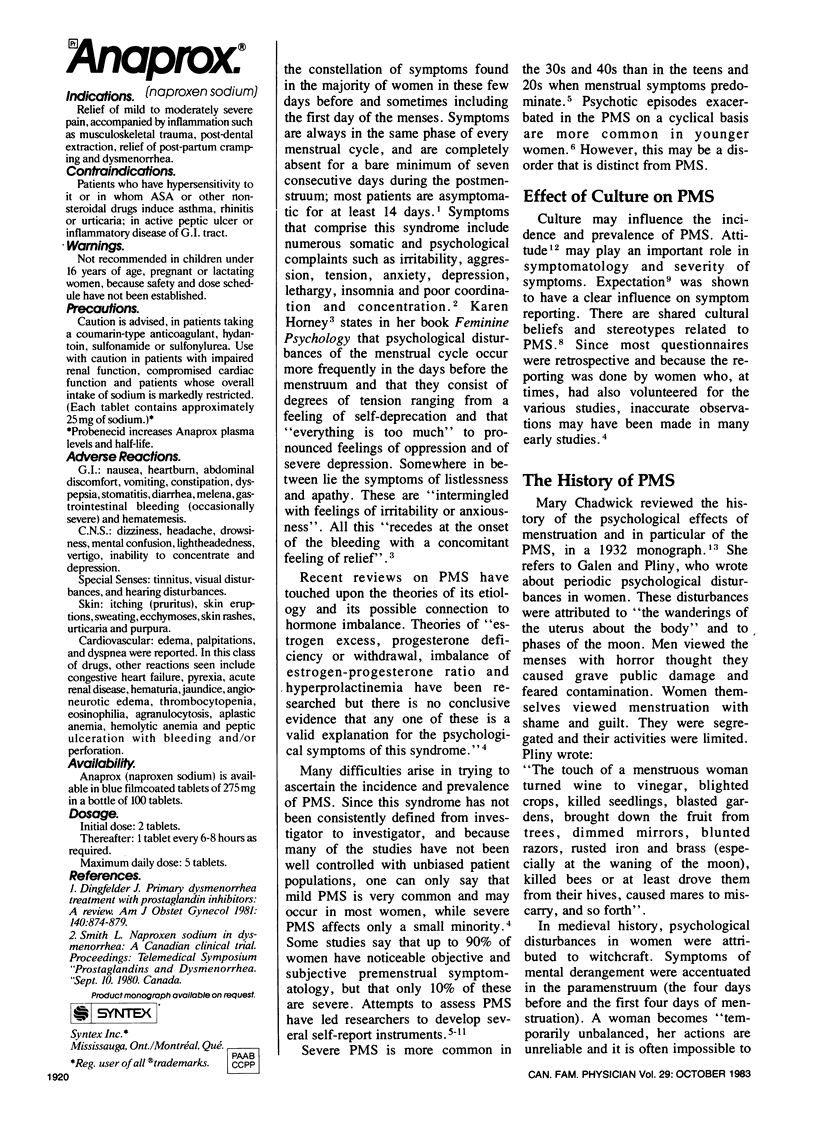
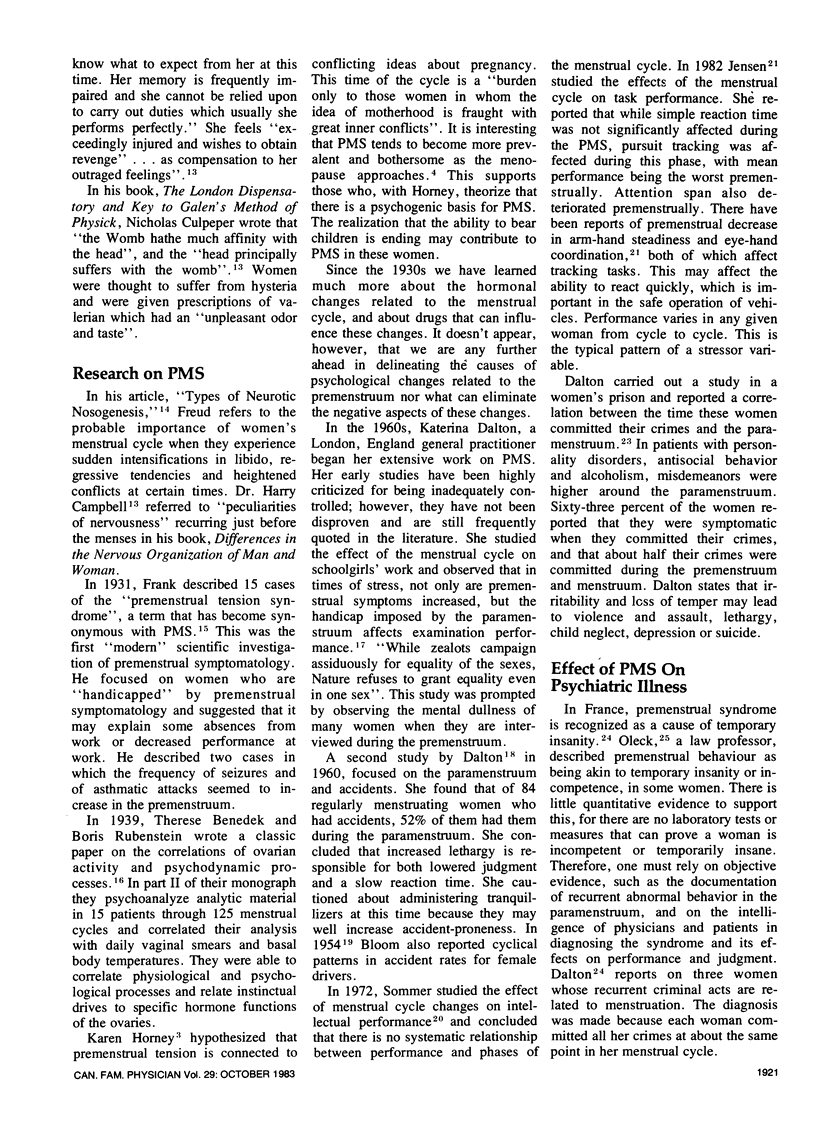
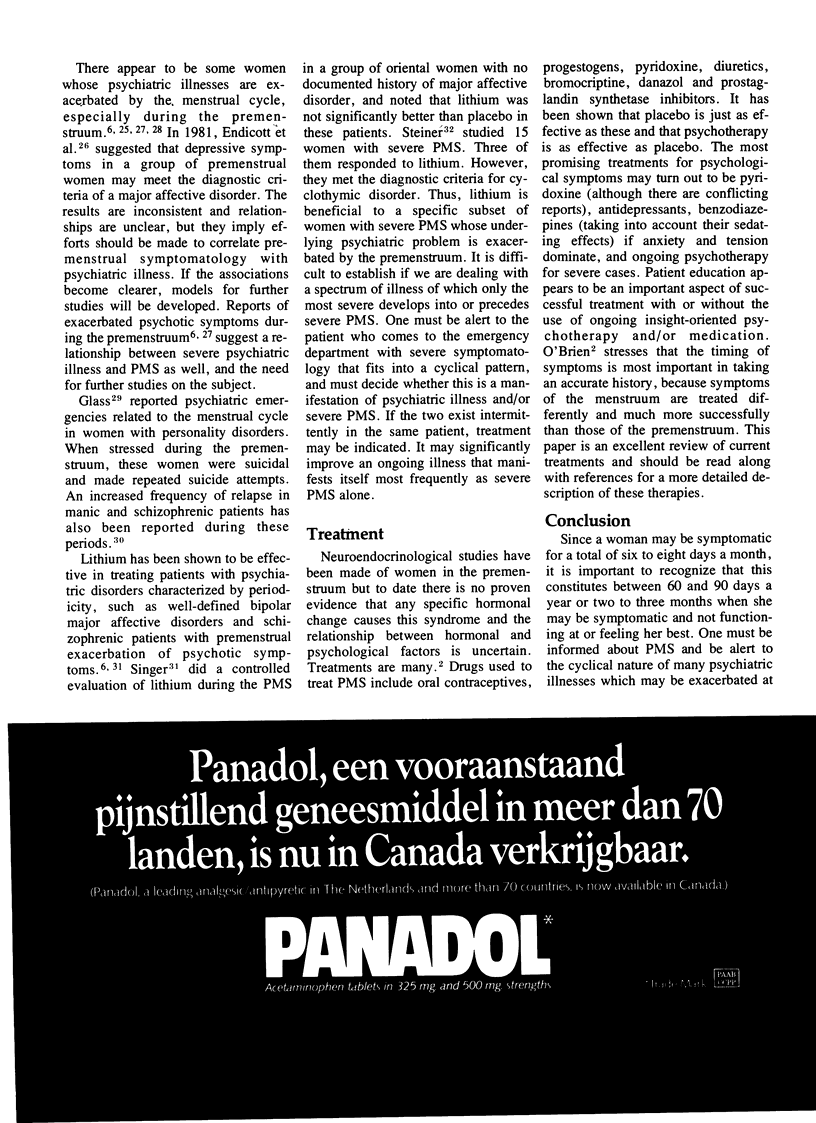
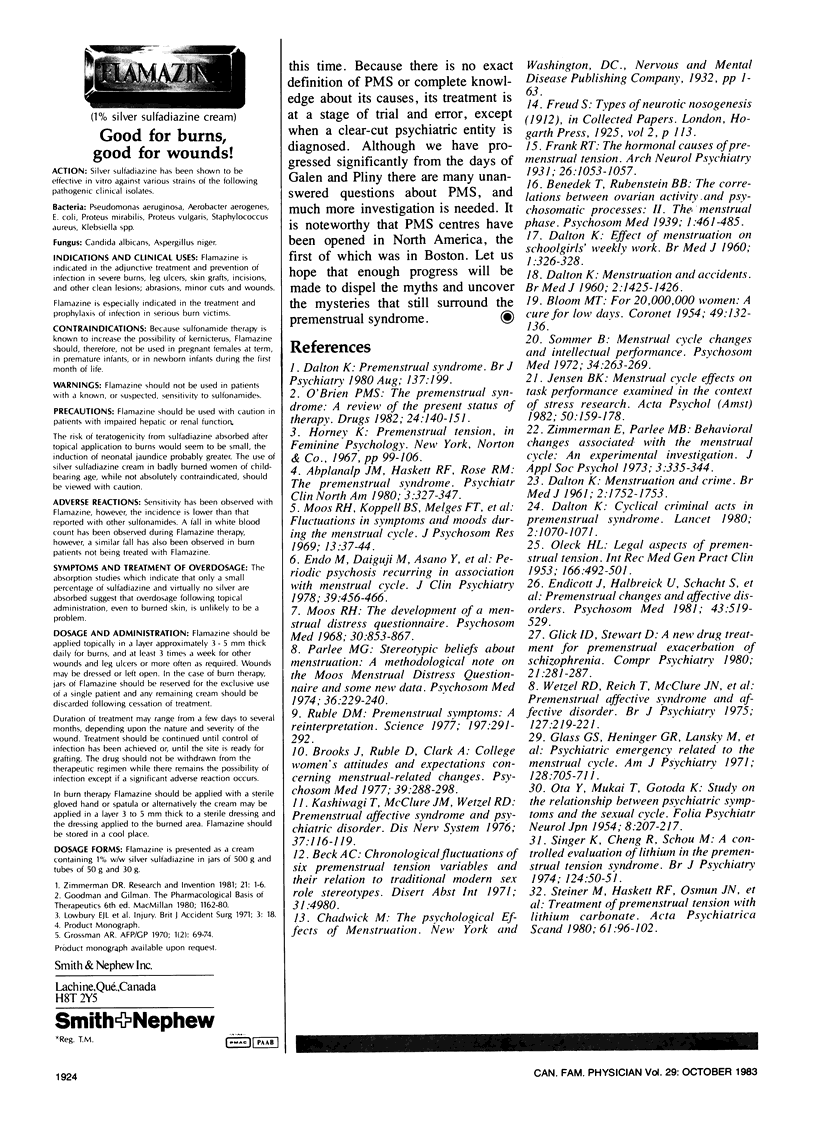
Selected References
These references are in PubMed. This may not be the complete list of references from this article.
- Brooks J., Ruble D., Clark A. College women's attitudes and expectations concerning menstrual-related changes. Psychosom Med. 1977 Sep-Oct;39(5):288–298. doi: 10.1097/00006842-197709000-00002. [DOI] [PubMed] [Google Scholar]
- DALTON K. Effect of menstruation on schoolgirls' weekly work. Br Med J. 1960 Jan 30;1(5169):326–327. doi: 10.1136/bmj.1.5169.326. [DOI] [PMC free article] [PubMed] [Google Scholar]
- DALTON K. Menstruation and accidents. Br Med J. 1960 Nov 12;2(5210):1425–1426. doi: 10.1136/bmj.2.5210.1425. [DOI] [PMC free article] [PubMed] [Google Scholar]
- DALTON K. Menstruation and crime. Br Med J. 1961 Dec 30;2(5269):1752–1753. doi: 10.1136/bmj.2.5269.1752. [DOI] [PMC free article] [PubMed] [Google Scholar]
- Dalton K. Cyclical criminal acts in premenstrual syndrome. Lancet. 1980 Nov 15;2(8203):1070–1071. doi: 10.1016/s0140-6736(80)92286-2. [DOI] [PubMed] [Google Scholar]
- Dalton K. Premenstrual syndrome. Br J Psychiatry. 1980 Aug;137:199–199. doi: 10.1192/bjp.137.2.199a. [DOI] [PubMed] [Google Scholar]
- Endicott J., Halbreich U., Schacht S., Nee J. Premenstrual changes and affective disorders. Psychosom Med. 1981 Dec;43(6):519–529. doi: 10.1097/00006842-198112000-00008. [DOI] [PubMed] [Google Scholar]
- Endo M., Daiguji M., Asano Y., Yamashita I., Takahashi S. Periodic psychosis recurring in association with menstrual cycle. J Clin Psychiatry. 1978 May;39(5):456–466. [PubMed] [Google Scholar]
- Glass G. S., Heninger G. R., Lansky M., Talan K. Psychiatric emergency related to the menstrual cycle. Am J Psychiatry. 1971 Dec;128(6):705–711. doi: 10.1176/ajp.128.6.705. [DOI] [PubMed] [Google Scholar]
- Glick I. D., Stewart D. A new drug treatment for premenstrual exacerbation of schizophrenia. Compr Psychiatry. 1980 Jul-Aug;21(4):281–287. doi: 10.1016/0010-440x(80)90032-2. [DOI] [PubMed] [Google Scholar]
- Jensen B. K. Menstrual cycle effects on task performance examined in the context of stress research. Acta Psychol (Amst) 1982 Mar;50(2):159–178. doi: 10.1016/0001-6918(82)90005-1. [DOI] [PubMed] [Google Scholar]
- Kashiwagi T., McClure J. N., Jr, Wetzel R. D. Premenstrual affective syndrome and psychiatric disorder. Dis Nerv Syst. 1976 Mar;37(3):116–119. [PubMed] [Google Scholar]
- Moos R. H., Kopell B. S., Melges F. T., Yalom I. D., Lunde D. T., Clayton R. B., Hamburg D. A. Fluctuations in symptoms and moods during the menstrual cycle. J Psychosom Res. 1969 Mar;13(1):37–44. doi: 10.1016/0022-3999(69)90017-8. [DOI] [PubMed] [Google Scholar]
- Moos R. H. The development of a menstrual distress questionnaire. Psychosom Med. 1968 Nov-Dec;30(6):853–867. doi: 10.1097/00006842-196811000-00006. [DOI] [PubMed] [Google Scholar]
- O'Brien P. M. The premenstrual syndrome: a review of the present status of therapy. Drugs. 1982 Aug;24(2):140–151. doi: 10.2165/00003495-198224020-00004. [DOI] [PubMed] [Google Scholar]
- OLECK H. L. Legal aspects of premenstrual tension. Int Rec Med Gen Pract Clin. 1953 Nov;166(11):492–501. [PubMed] [Google Scholar]
- OTA Y., MUKAI T., GOTODA K. Studies on the relationship between psychotic symptoms and sexual cycle. Folia Psychiatr Neurol Jpn. 1954 Dec;8(3):207–217. doi: 10.1111/j.1440-1819.1954.tb00700.x. [DOI] [PubMed] [Google Scholar]
- Parlee M. B. Stereotypic beliefs about menstruation: a methodological note on the Moos Menstrual Distress Questionnaire and some new data. Psychosom Med. 1974 May-Jun;36(3):229–240. doi: 10.1097/00006842-197405000-00006. [DOI] [PubMed] [Google Scholar]
- Ruble D. N. Premenstrual symptoms: a reinterpretation. Science. 1977 Jul 15;197(4300):291–292. doi: 10.1126/science.560058. [DOI] [PubMed] [Google Scholar]
- Singer K., Cheng R., Schou M. A controlled evaluation of lithium in the premenstrual tension syndrome. Br J Psychiatry. 1974 Jan;124(578):50–51. doi: 10.1192/bjp.124.1.50. [DOI] [PubMed] [Google Scholar]
- Sommer B. Menstrual cycle changes and intellectual performance. Psychosom Med. 1972 May-Jun;34(3):263–269. doi: 10.1097/00006842-197205000-00008. [DOI] [PubMed] [Google Scholar]
- Steiner M., Haskett R. F., Osmun J. N., Carroll B. J. Treatment of premenstrual tension with lithium carbonate. A pilot study. Acta Psychiatr Scand. 1980 Feb;61(2):96–102. doi: 10.1111/j.1600-0447.1980.tb00569.x. [DOI] [PubMed] [Google Scholar]
- Wetzel R. D., Reich T., McClure J. N., Jr, Wald J. A. Premenstrual affective syndrome and affective disorder. Br J Psychiatry. 1975 Sep;127:219–221. doi: 10.1192/bjp.127.3.219. [DOI] [PubMed] [Google Scholar]


